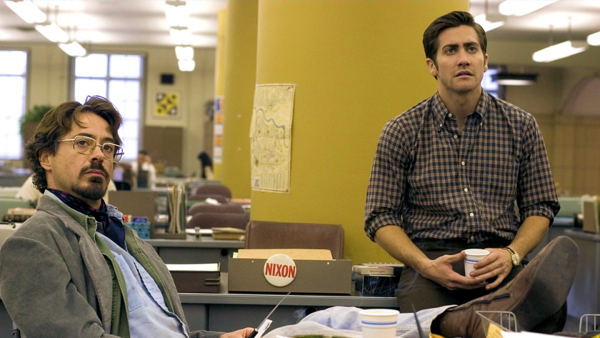Movie review by Greg Carlson
Followers of the career of director David Fincher have come to expect big things of the filmmaker. A stylish craftsman with a muscular command of storytelling and a ferocious appetite for impeccable technical specs on his films, Fincher has a rabid fanbase of moviegoers who enjoy journeys that explore the darker side of human nature. “Zodiac” is certainly Fincher’s most complete cinematic experience, even if it will never achieve the same kind of cult that surrounds “Fight Club.” At two and a half hours, it comes dangerously close to wearing out its welcome, but Fincher’s obvious interest in the material, combined with his smart sense of pacing, elevates “Zodiac” to the front rank of its director’s impressive resume.
While the movie focuses on the events surrounding the still-unsolved Zodiac serial killer case that began as the 1960s came to an end, Fincher’s thematic concerns transcend a simple cat-and-mouse exploration of good guys out to catch a very, very bad guy. The screenplay’s obsessive attention to a dizzying array of details immerses the viewer in the maddening process of chasing a ghost who ironically seems to recede as the facts and clues and case file folders pile up. It has already been suggested that “Zodiac” works best as a study of life in the information age, and this may be true. The film is also a study of the odd lengths to which people will go in order to achieve some kind of recognition. This eerily applies to the Zodiac himself as well as the men who hunt him.
While the actors acquit themselves admirably in their roles, “Zodiac” is decidedly not a performer’s showcase. Because the narrative focus is shifted among a group of key players in the unfolding Zodiac saga, the audience has the opportunity to follow along with both Jake Gyllenhaal in his turn as Robert Graysmith, the cartoonist who ended up authoring more than one book on the Zodiac, and Mark Ruffalo as David Toschi, the police detective who spent a considerable amount of time and energy in the initial investigation. We also cross paths with a gallery of intriguing folks who might lack in screen time, if not the ability to leave an impression. Robert Downey Jr. lightens the mood as SF Chronicle writer Paul Avery, Brian Cox makes a perfectly pompous Melvin Belli, the high-profile lawyer, and John Carroll Lynch, as suspect Arthur Leigh Allen, inspires nightmares.
Many true crime buffs agree that the allure of the Zodiac lies in his personal relationship to the press and the police, and Fincher lovingly re-imagines the newsroom of the San Francisco Chronicle in the early 1970s. The killer was fond of sending encrypted messages and other missives to the Chronicle and other newspapers, and the correspondence established a ghoulish connection between the murderer and the media. As for the murders themselves, Fincher keeps the most graphic violence to a minimum, although the film’s opening set piece, along with a daylight attack on a pair of lakeside picnickers, is visceral and unsettling. While the Zodiac case remains open in some jurisdictions, it is inevitable that Fincher would have to find an alternative resolution to the film. That he succeeds in satisfying his viewers is a mark of his increasing skill as one of the industry’s most fascinating moviemakers.
